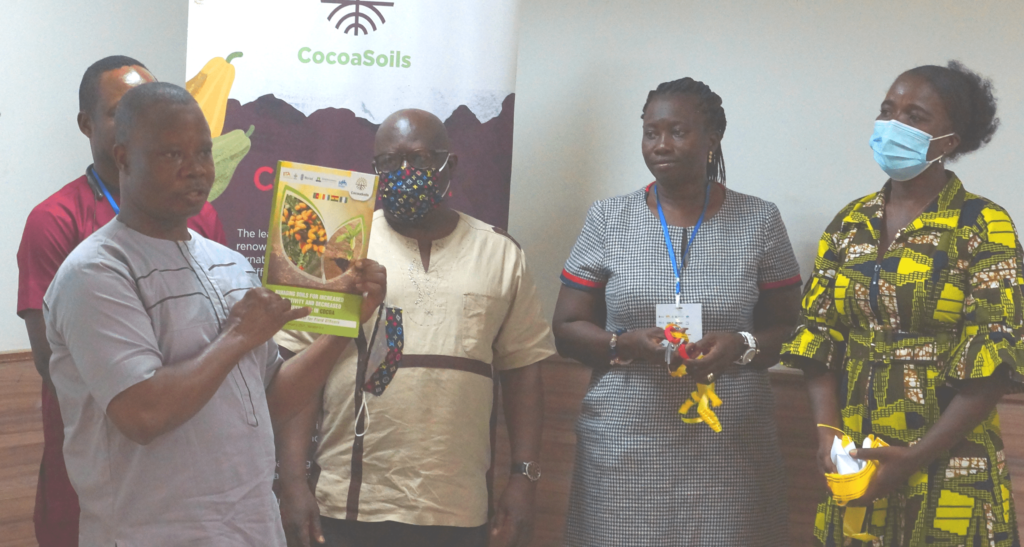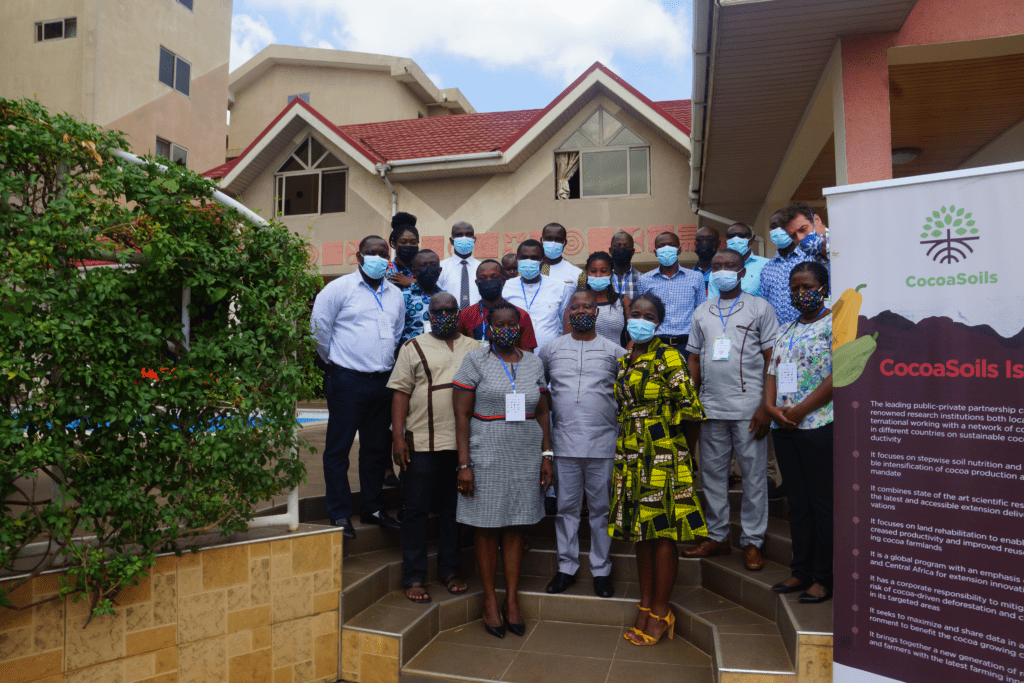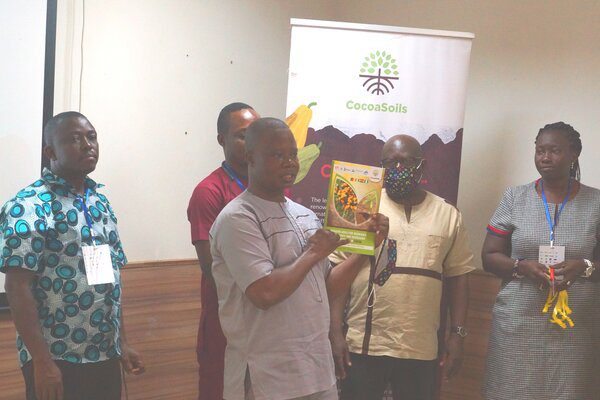The CocoaSoils programme has unveiled a training manual on managing soils fertility for improved cocoa productivity and decreased deforestation at a Partnership for Delivery (P4D) committee meeting held in Kumasi on October 14th, 2021 with the programme’s private sector and public sector partners.
The manual was unveiled by Dr. Amos Quaye, Research Scientist at the Soil Science Division of the Cocoa Research Institute of Ghana (CRIG and the Core Trial Manager of the CocoaSoils programme in Ghana, with support from Janet Owusu-Asabre, Project officer of the CocoaSoils Project and Glowen Kyei-Mensah of IDH and representatives of the programme’s private partners.
Present at the unveiling ceremony were representatives of the programme’s private sector partners: Kuapa Kokoo, Mondelez, Rockwinds, Barry Callebaut, Yara and Nestle. The unveiling ceremony was also witnessed by representatives of the Cocoa Research Institute of Ghana (CRIG) which is the programme’s focal research partner in Ghana, Cocoa Health and Extension Division, COCOBOD, Forestry Commission and the Cocoa and Forests Initiative.
The manual was developed with input from the programme’s private sector and public sector partners by considering the key capacity needs of cocoa farmers in Cameroon, Côte d’Ivoire, Ghana and Nigeria.
The objective of the manual is to introduce the importance of nutrient supply through fertilizer application in cocoa farms and the need to implement good agriculture practices to maximize cocoa yield and income and decrease deforestation.

It provides up to date recommendations on the year-round management operations to increase cocoa productivity.
The manual was developed to transmit up to date knowledge and know-how and the skills required to foster communication between field officers and cocoa farmers.
It was designed to help field officers to pass on the latest knowledge in cocoa production to farmers in a language that ensures a good understanding of messages.
The manual was reviewed by the Partnership for Delivery (P4D) committees in Cameroon, Côte d’Ivoire, Ghana and Nigeria to ensure that the content is relevant and that the language is not too scientific for the farmers.
Dr. Amos Quaye, research scientist at CRIG and the Core Trial Manager of the CocoaSoils programme in Ghana said the manual has been prepared as a tailored-made document to train field officers who manage CocoaSoils trials plots across Ghana to make sure that the work in accordance with the CocoaSoils programme’s protocols.
“It is meant for use by programme's partners, their field officers and their farmers to improve farming activities and consequently increase cocoa yield and income,” he added.

About CocoaSoils Programme
The Norwegian funded CocoaSoils Programme is a public-private consortium led by the Institute of Tropical Agriculture (IITA) and Wageningen University and Research (WUR), the Netherlands. The Sustainable Trade Initiative (IDH) provides a convening role in this programme that brings partners together in an environment where knowledge and ideas are shared in a ‘pre-competitive’ space. CocoaSoils was developed to address the issue of declining productivity in cocoa for improved livelihoods of farmers, while avoiding deforestation. This five-year programme is being undertaken together with the National Cocoa Research Institutes in Ghana, Nigeria, Côte d’Ivoire and Cameroon in conjunction with some private chocolate and fertilizer manufacturing companies across the globe.
The programme is constructed out of two pillars. The first is the Research for Development, R4D, component that focuses on a deeper understanding of cocoa agronomy and nutrient management and the development of Integrated Soil Fertility Management, ISFM, recommendations.
The second pillar, Partnership for Delivery, P4D, aims to reach at least 90,000 cocoa farmers in Cameroon, Côte d'Ivoire, Ghana and Nigeria with the ISFM recommendation from the R4D component through the dissemination network of private sector partners like Olam, Kuapa Kokoo, Rockwinds, Cargill and Mondelez and support from the in-country public sector.
The partnership with private partners in the cocoa sector aims to identify and address the major gap in the knowledge base required to close cocoa yield gaps and deliver this knowledge to farmers through the training of farmers by the extension agents of the programme’s private sector partners.
The Partnership for Delivery (P4D) Committee facilitates the dissemination of the CocoaSoils Integrated Soil Fertility Management (ISFM) recommendations in Ghana to farmers by:
i. Providing guidance and feedback on the programme implementation
ii. Validating recommendations of the Research Committee
iii. Promoting the dissemination of these recommendations
In Ghana, the committee comprises representatives of private sector partners such as Kuapa Kokoo, Olam, Cargill, Rockwinds, Yara, Nestle and Mondelez. Other members of the committee include representatives of CRIG, Forestry Commission, COCOBOD and CHED
Latest Stories
-
Our mindset should breed excellence – Ace Ankomah
10 mins -
SML fully delivered on Transaction Audit Service Agreement with GRA
34 mins -
Government trying to hide something from SML/GRA contract – Arthur Kennedy
38 mins -
Don’t encourage lateness and foolishness – Ace Ankomah to UG Vice Chancellor’s award winners
41 mins -
‘Obroni wawu’ traders plan to protest over Kumasi Central Market Redevelopment delays
45 mins -
Gold Fields Ghana boosts cocoa production in Huni Valley District through Cocoa Farmers’ Support programme
46 mins -
Spanish government to oversee football federation after Luis Rubiales scandal
58 mins -
TikTok will not be sold, Chinese parent tells US
1 hour -
Bawumia is ready to announce his running mate – Miracles Aboagye
1 hour -
Works and Housing Ministry launches BENCHH 2024
2 hours -
You misunderstood Bawumia’s ‘driver’s mate’ analogy – Miracles Aboagye tells Naana Opoku-Agyemang
2 hours -
Bulk Oil Distributors object to government’s plan to designate BEST sole off-taker
2 hours -
NPP likely to retain Ejisu seat – Global InfoAnalytics
2 hours -
Government allocates $20m for Kpong Irrigation Scheme expansion
2 hours -
Today’s front pages: Friday, April 26, 2024
2 hours

